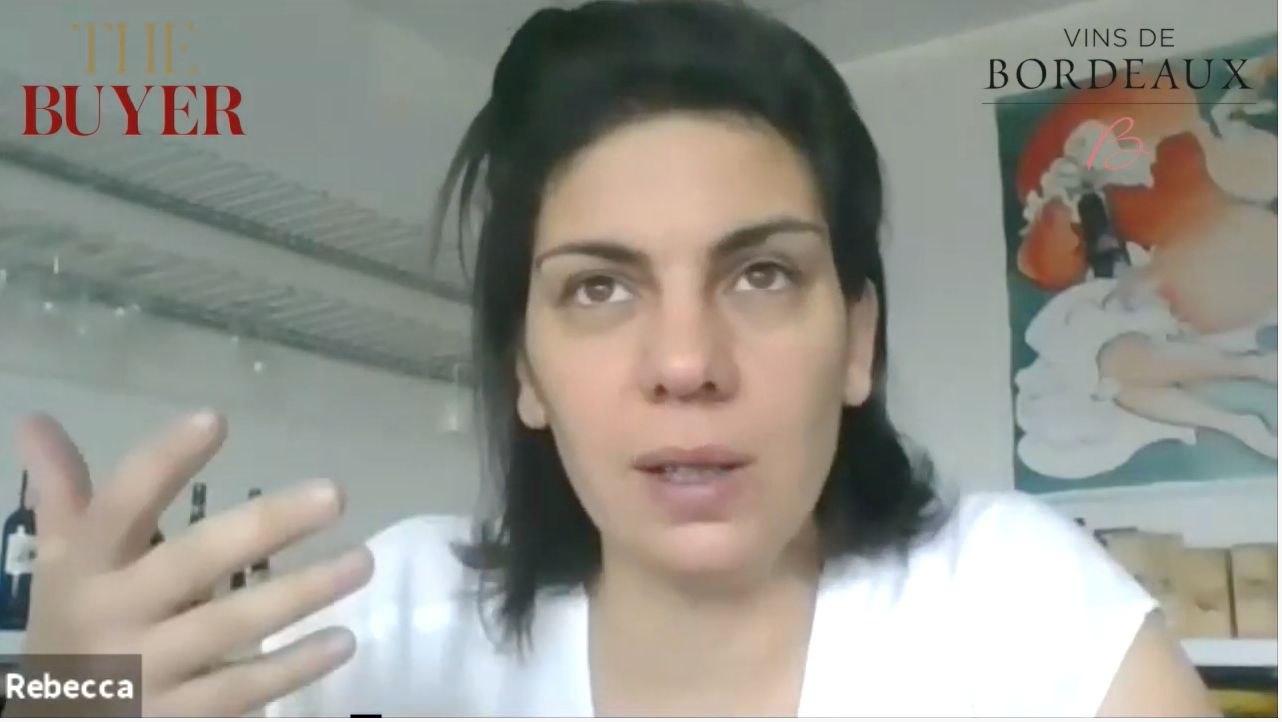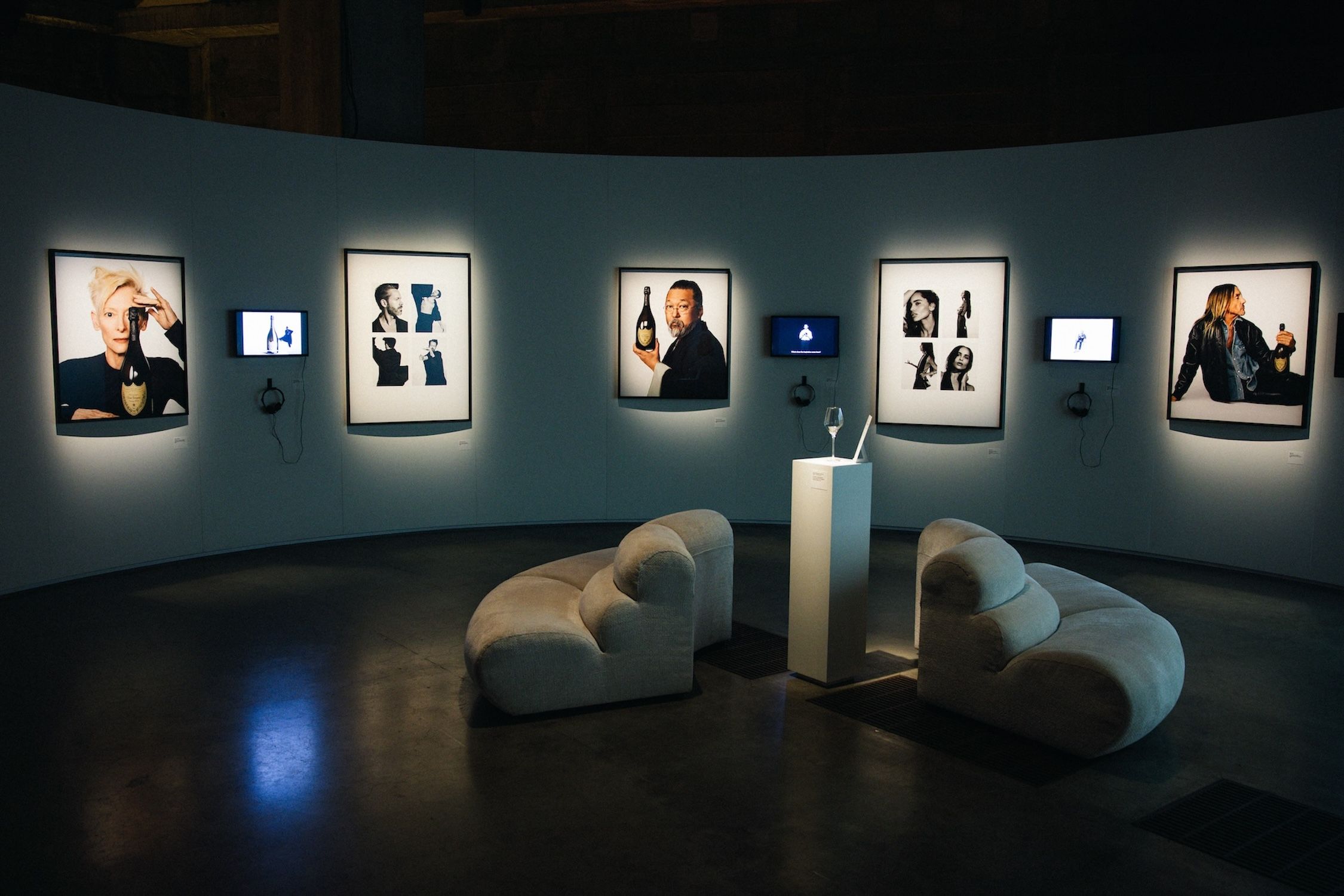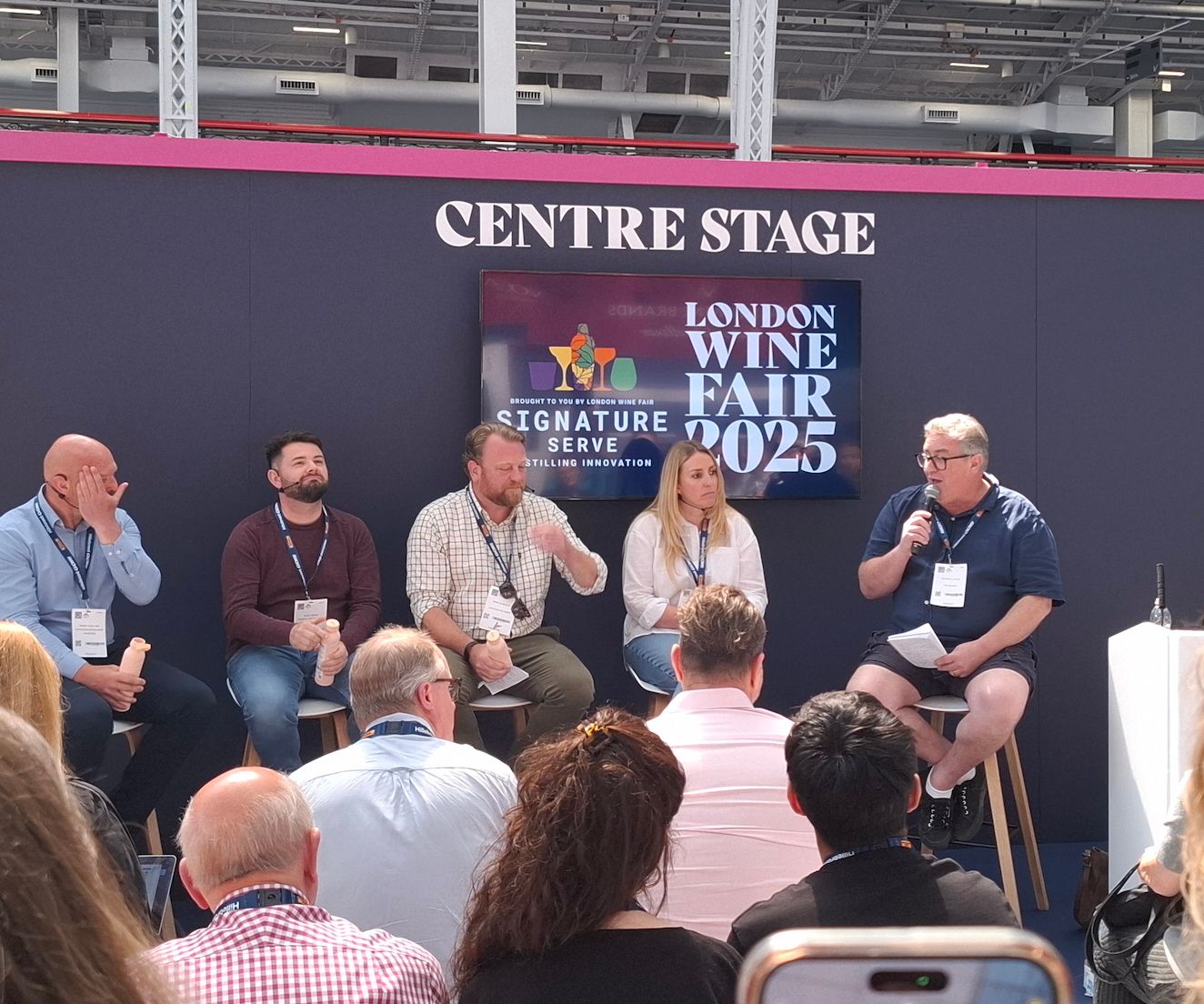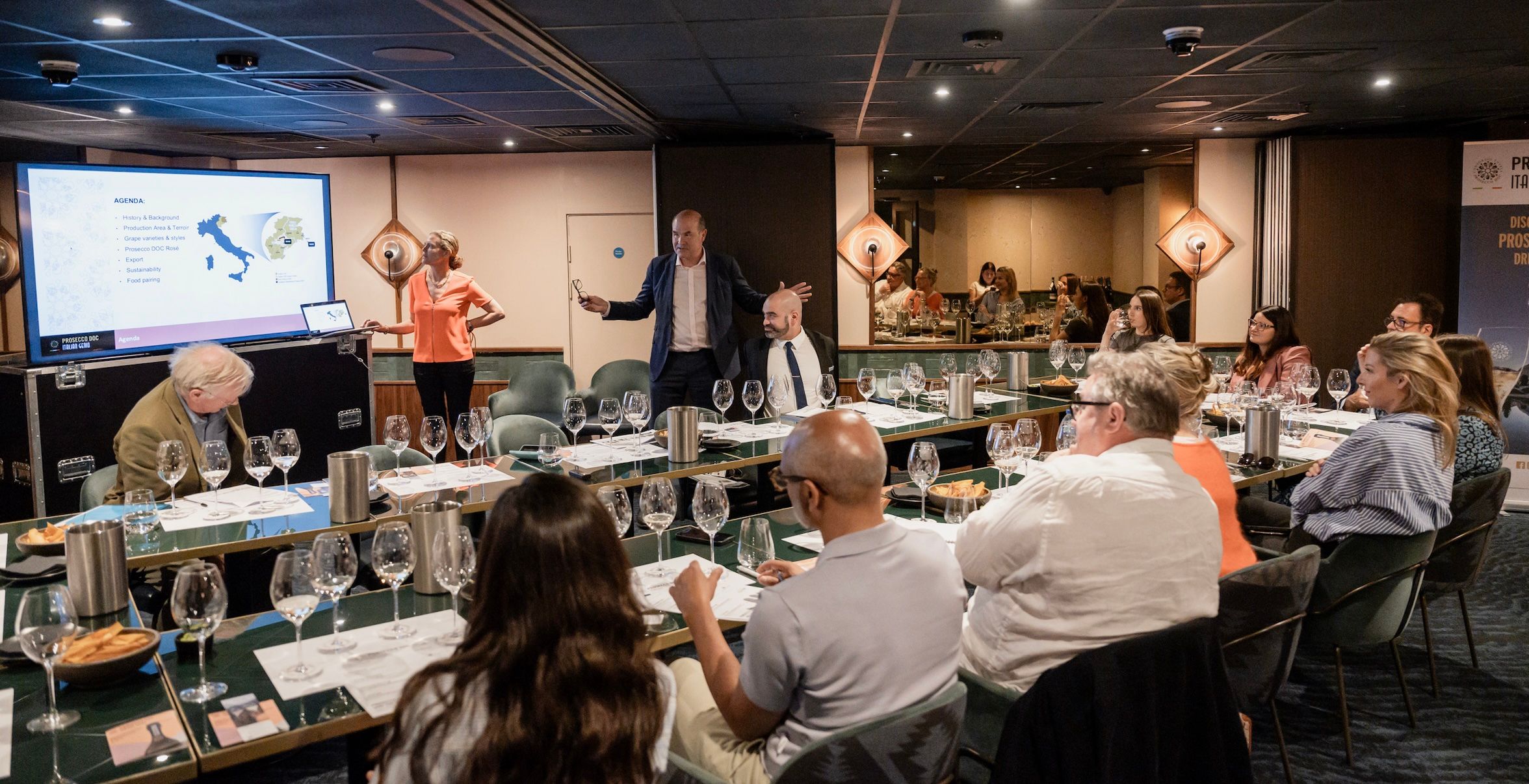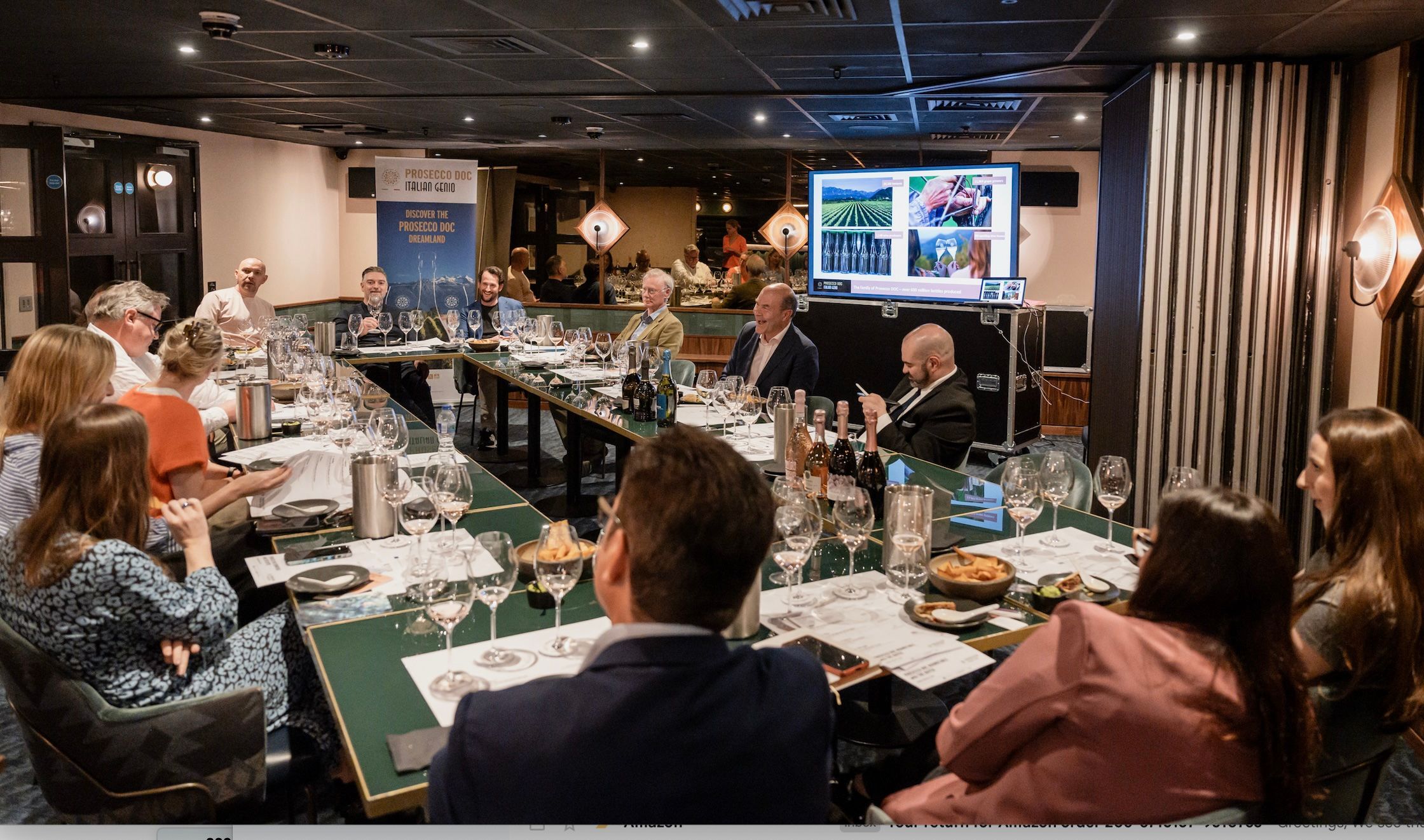The panel for The Buyer & CIVB’s ‘Modern Bordeaux’ debate included: Bordeaux producers Fabrice Bandiera, owner and commercial director of Château des Laurets and David Siozard, commercial director at Vignobles Siozard. The UK buyers’ panel included: wine consultant and Bordeaux specialist, Richard Bampfield MW; Tom Harrow, co-founder of Honest Grapes; Rebecca Gergely, wine buyer at Enotria&Coe; Mags Jango, sales director of MJ Wine Cellars; Justin Knock MW, chief wine analyst at Oeno Group; and Elly Owen, wine director at the Old Garage Wine and Deli in Truro.
You can read the first part of the debate here.
(You can watch the full recording of the debate between UK buyers and Bordeaux producers by clicking below)
Compared to other parts of the winemaking world, historically things have happened at a slower pace in Bordeaux. But for a very good reason. With such a complex and diverse number of appellations, certifications and regional differences there is simply no one size fits all approach it can take. Instead, every decision needs to be analysed, planned, researched and only implemented when it is 100% sure it is in the right, long term interests of the region and its 1,000s of growers and producers.
It’s a position that is recognised and admired by the panel of UK buyers that took part in the recent debate with the CIVB to determine just how far the region needs to change and adapt to keep them interested in the wines being made.
Justin Knock, at the Oeno Group, says what is most impressive about the viticultural changes taking place in Bordeaux is they are all in the long-term interests of the region as a whole.
Even any experimentation that is taking place “happens very carefully, very slowly, and under the surface,” adds Knock, but “to a level of degree that we can barely comprehend in other wine regions”. “The changes we see as a consumer are subtle but they are always going on,” he adds. “Richard (Bampfield) says he has seen Bordeaux change a lot over the last 25 years, but it has changed a lot every year over those 25 years, it’s not one point where everything changed.”
(Click here for Justin Knock on how Bordeaux plans and looks to the long term like no other wine region)
The way it is now allowing new grape varieties to be introduced is “ground breaking” for the region, he adds, but crucially it is not rushing to make these changes, but looking at the far future and what these new varieties might be able to offer. “They are looking a long, long way down the track but are never going to make a big song and dance about it because people want to still see that consistent style and quality that is reassuringly Bordeaux. They are masters at that,” he says.
Sustainable future
Sustainability is another major modern trend that Bordeaux as a whole is taking very seriously. The CIVB has taken an active role in encouraging producers to adopt sustainable practices with 65% of vineyards currently operating under a sustainable certification.
Vignobles Siozard is in year two of converting over to organic production and this continues to be an “eye opening” and “big learning experience,” says David Siozard, one of two brothers behind this forward-thinking producer that makes wine from grapes grown acres nine appellations for its two domaines. But the Siozards also know that making the commitment now to organics is going to be crucial in the future if they are going to maximise the opportunity for Vignobles Siozard and its 65 hectares that currently help them make 25 different wines.
It is also pushing more winemakers to try different ageing methods and look at non-traditional barrel ageing and greater use of terracotta pots and amphorae, adds Fabrice Bandiera of Château des Laurets, which is part of the Edmond de Rothschild Heritage group, and one of the largest estates in St Emilion with 72 hectares.
Vignobles Siozard is one of an increasing number of producers that have cut down on using sulphites in their wines, but Siozard concedes that this is more down to the fact that his brother, Laurent, the winemaker is allergic to them. Sulphites are only used to protect the vines with the ultimate goal of producing “very fruity, easy to drink, rounded wines”.
The panel had the chance to taste Elémentaire No Added Sulphites Cabernet Sauvignon 2019, (on sale with Virgin Wines for £16.99) which again is following the fruit-forward, fresh style with modern packaging and is typical of a new category of wine being made in the region.
Knock is pleased to see sustainability and organics high up the Bordeaux agenda, particularly in a region which has such difficult weather conditions to cope with for organic viticulture, in particular.
How Bordeaux is finding ways to cope with, what Richard Bampfield says can be “appalling” weather conditions to grow grapes and follow a sustainable agenda, is even more impressive considering just how hard it is to do in the region.
“I used to think Bordeaux was the hardest place in the world to be organic and sustainable,” says Bampfield, “and a great deal of credit should go to the CIVB and the work and leadership it has done “to encourage more producers to go down a sustainable path, even if it is not organic. I think they have done an amazing job.”
Right way forward
(Click here for Richard Bampfield on his admiration for how well Bordeaux has taken to organic winemaking)
Tom Harrow says it certainly fits into what Honest Grapes is looking to do in promoting sustainable wines and environmental producers and been able to pick up some awards along the way for doing so. “It’s very important to us as a business and we look very closely at all the châteaux, estates and domaines that we work with directly to make sure that sustainability is at the forefront of their philosophy too,” he says, but stresses it is less about having the right certification it is more their “genuine concern for minimum intervention and minimum amount of chemical treatments etc”.
He says he was impressed by a forum that Honest Grapes hosted earlier in the year looking at sustainability in Bordeaux at the level of which many châteaux “are going above and beyond what they need to put on a label”. He believes it’s an issue that will “impact on how successful Bordeaux is in reaching new consumers” particularly younger wine buyers “who want to know they are buying products that are environmentally friendly. It’s clear that is becoming more important in Bordeaux and more to the good.”
Growing demand for organics
Rebecca Gergely says Enotria&Coe is also seeing a big spike in demand from customers looking for sustainable wines. But when it comes to France, that demand is for wines from the south of France and Languedoc. She has yet to have an account manager come to her saying their customers are looking for more sustainable wines from Bordeaux. “So, again, I think it will take some time for people to understand that Bordeaux is open to change,” she says, “but it is certainly an area that, as buyers, they are looking at how sustainable producers are, but also with the caveat that it is not always possible for smaller producers to follow the same practices and certification.”
Mags Jango at MJ Wine Cellars says it is also important that buyers look at what is taking place at the winery, the bottling, packaging and recycling as well as the vineyards when assessing sustainability. It is also now a key aspect of any tender if you are looking to create wines and bespoke brands for supermarkets, he adds. “It’s a requirement from retailers and consumer alike,” he says.
Elly Owen says sustainability and organics are themes that come up time and again amongst customers at Old Garage Wine, which runs two shops in Cornwall, when they are looking at wines to buy, particularly among younger drinkers.
Opportunity for single varietal wines
(Click here for Elly Owen and Richard Bampfield MW on huge potential for single varietal wines from Bordeaux)
Siozard was able to show his Ipsum range of varietal wines with six different cuvées all celebrating one particular variety. They include: Merlot (with no sulphites); Cabernet Franc; Cabernet Sauvignon; Petit Verdot; Carménère; and Malbec.
These are wines that he believes reflect modern Bordeaux compared to the historic made up of classic chateaux producing traditional blended wines. The two are well placed to operate in parallel to each other, helping to widen the region’s appeal. “There is no competition between the new and old cuvees,” he stresses. “I do both styles. I do classic Bordeaux aged in oak barrels with big tannins and big wines. But I also do fresh, very easy, soft tannin wines.”
He calls them “new” but this is actually the tenth vintage of Ipsum and the wine put forward to taste was his Merlot which has also been produced sulphite-free for those 10 years. “It was quite rare to have sulphite-free wine when we first started,” he says. “Now a lot of winemakers are managing techniques to offer clean and perfect free sulphite wine.”
To do that means taking great care both in the vineyards and the cellar to be clean and on top of health standards. Get it right and you are “reflecting the perfect expression of the grape,” he says.
The label for Ipsum is also deliberately clean, and a clear break from the traditional château-driven Bordeaux label with just the brand name and the grape variety, designed to appeal to UK and US drinkers.
Buyers’ support
Harrow was quick to jump in to say how much he “loves” the idea of a Bordeaux brand based on single varietals and thinks it makes perfect sense, particularly for producers who are not in a designated classified growth area. “If there is not that a huge weight of expectation, or reputation, a history, a noble family or massive multinational behind you, then I think this is the perfect time to experiment and appeal to the new consumer,” he says. “I think it is a brilliant thing to do and I congratulate David on this sort of initiative.”
Simply putting “Merlot” right front and centre on a label means you are talking to the modern wine drinker in a language they understand, he adds. Do the same with a “château, a sub-region of a sub-appellation” and you have switched off the majority of wine consumers.
Owen agrees and not only does it “make sense” but it is an “easy introduction” to a notoriously hard region to penetrate to the everyday wine drinker. “The wines are great; they taste lovely and people can instantly recognise what they are.” They are also a good way of getting Bordeaux wines into the hands of younger drinkers and “building trust” with them that way.
Bampfield believes there is “loads of scope” for innovation of Bordeaux wines priced between £10 to £30. “It’s never been easier to communicate about what you are doing than there is now,” he adds, and the label is an area that is so open for Bordeaux producers to take advantage of.
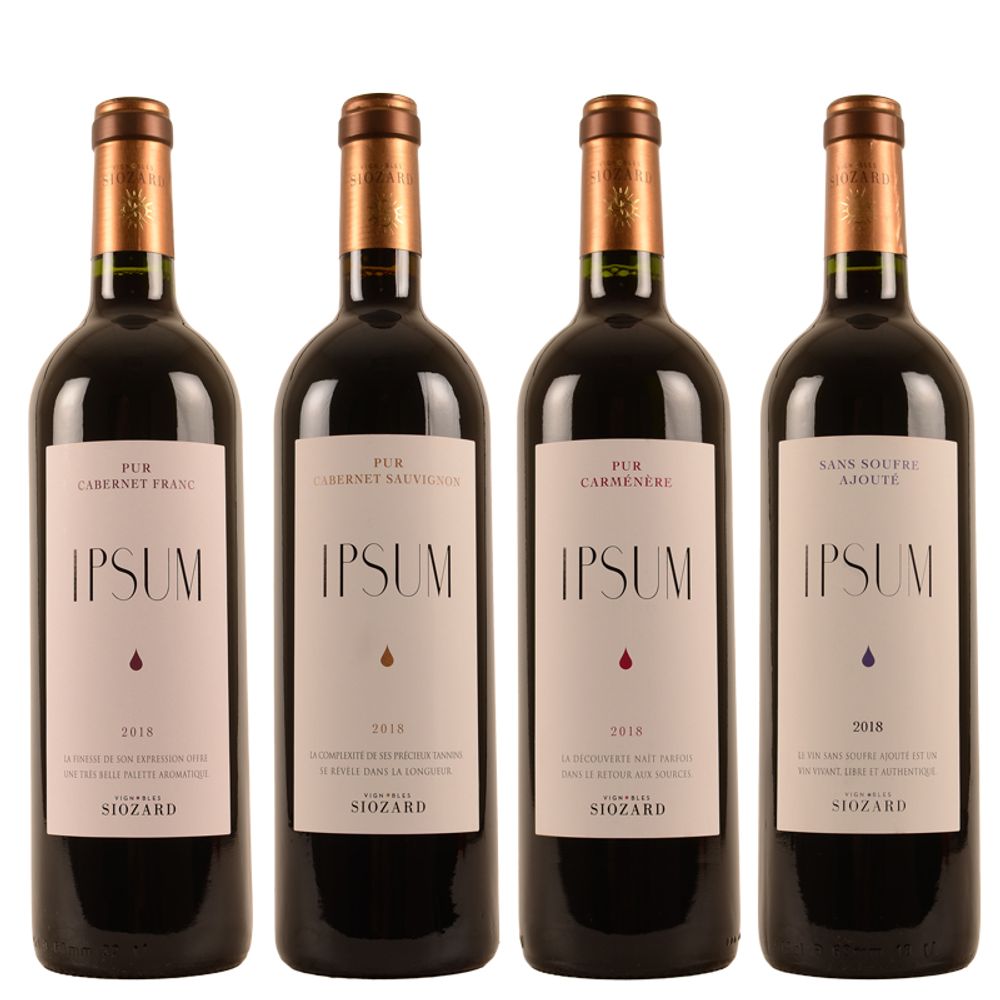
The Ipsum range from Vignobles Siozard is a good example of what producers are now doing in Bordeaux with single varietals
He liked both the Siozard Ipsum and Château de Malengin Eve Merlot styles. As he explains: “The two Merlot-based wines we’ve tasted just express the good bits and the joy of Merlot very well.”
Of the Ipsum he adds: “Good young, fresh Merlot should make you smile and that’s exactly what this does and I liked it when David said it’s like biting into a bunch of Merlot grapes as that is exactly how it tastes.”
Owen says it is so refreshing to see the Eve Merlot being “so fruit forward and easily approachable – it’s delicious”.
The panel had a similar analysis of a Malbec from the Arbo family, now run by Bernadette Arbo, the fifth generation to manage the estate on Bordeaux’s Right Bank. Here there is a touch of Merlot to soften the Malbec which Gergely says results in a “nice rounded wine with soft tannins, and nice acidity”.
Gergely says it is good to see more producers making single varietal wines and they are well placed to do well in independent wine merchants and fine dining where they can be hand sold as more of a “discovery wine” for customers.
Jango loved both the Merlot and particularly the Malbec which, he says, sits in that “perfect sweet spot” between a Cahors (“tart and austere”) and Argentine Malbec (“powerful and alcoholic”) where it has that a “lovely freshness and austerity but still has that feeling mid palate”. “It’s very much an indie wine and hand selling wine, but this is the direction that the market is moving towards. This goes pound for pound with Riojas and wines from the southern Rhône which Bordeaux traditionally has not competed with but it gives Bordeaux the opportunity to get into new markets and talk to new clients.”
The panel also tasted, and liked, the 100% Cabernet Sauvignon from Chateau Constant Lesquireau, which Gergely saw as being more in tune with a classic Bordeaux rather than the obviously fruit forward wines that were part of the panel’s selection. “From my personal taste, this is what I expect from Bordeaux. It is really well made, with a nice extraction.”
Jango says it makes perfect sense for Bordeaux to fully capitalise on what he sees as its two main “sub-categories” – the classic, traditional blended wine and single varietals.
“The fact they don’t compete with each other is such a great thing. It allows you to show the tradition and the heritage which is great, but it allows you to show there is another end of the spectrum where you have wines like this Merlot and Malbec,” he explains.
It’s an approach that both the French producer panellists see as being very much part of Bordeaux’s future. David Siozard was also able to show an example from his Hexa range of wines that are an equal blend of six classic Bordeaux varieties – Merlot, Cabernet Sauvignon, Cabernet Franc, Petit Verdot, Malbec and Carménere.
Its point of difference here is to do some of the ageing in 750 litre egg-shaped amphora to bring out the freshness in the wine and to soften and round the tannins and make the approachable, affordable wines the market is looking for. “We want to make something that people can enjoy young,” says Siozard.
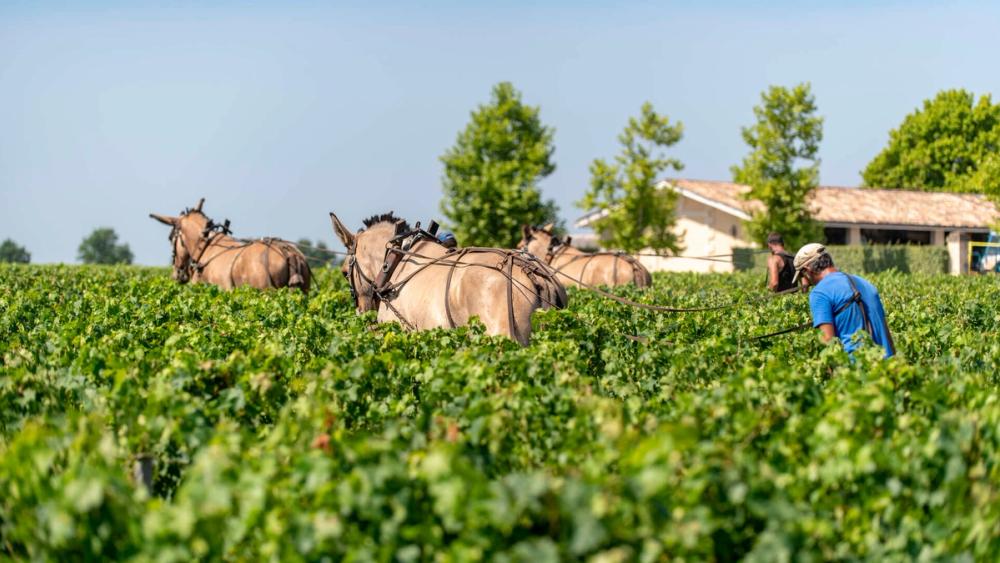
The drive to sustainability combined with making more modern styles of wine means Bordeaux is a very different proposition to where it was 10 years, says the buyers’ panel
Buyers’ summary
“Keep up the good work. It’s exactly what Bordeaux needs,” is how Richard Bampfield concluded the session, praising in particular the wines from the two winemakers.
It was the chance to go behind the scenes and see wines that don’t always make it to the UK that captured Gergely’s interest: “I think there is a real future for these wines. It’s good to hear, especially as a French buyer that one of the strongest wine regions in France is open to re-inventing itself. It’s really positive and I am excited to see what comes next.”
Owen says the “re-invention of Bordeaux” is what it is really “fascinating” to her and how it can change perceptions of such a classic wine region.
Harrow is looking forward to having a “great excuse to build exciting, relevant narratives around value rich wines” from Bordeaux.
Jango says it was great to be able to taste a range and style of wines he had not come across before and the session had “opened his eyes” to Bordeaux as a great source of easy drinking, fruit forward wines.
Which was all music to the ears of the two producers taking part – Fabrice Bandiera and David Siozard – and also a big boost, says Siozard, to the “thousands of Bordeaux producers” who are all working hard together to “adapt their wines to your needs”.
- You can read the first report of the buyers analysis of Bordeaux here.
- To find out more about the changes and developments being made you can go to the CIVB website here.
- You can taste for yourself the modern styles of wine being made in Bordeaux at its Bordeaux Day events taking place this week. Following the September 8 tasting in London there is a chance to take part in the Manchester tasting taking place at Oglesby Atrium, Stoller Hall, Hunts Bank, Manchester, M3 1DA. Register here.

